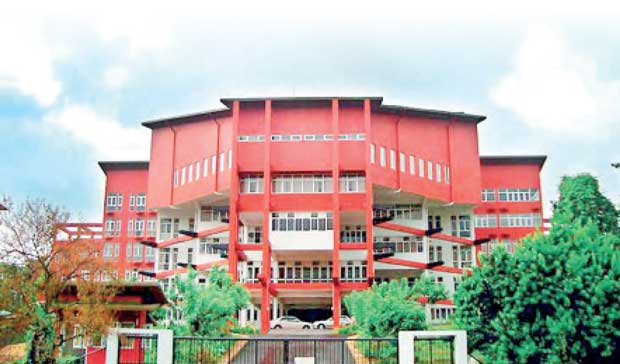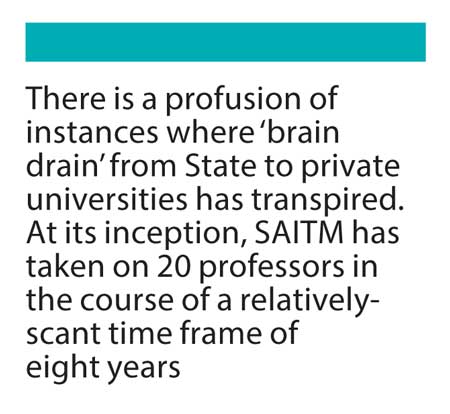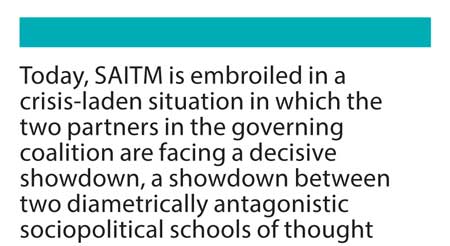Reply To:
Name - Reply Comment
Last Updated : 2024-04-23 20:04:00
 Have you ever wondered why State medical students have taken to the streets to protest against the private medical faculty at Malabe, the South Asian Institute of Technology and Medicine (SAITM)? Has this resistance evolved in fear of an imminent trepidation on their part or is this an act of utilitarianism?
Have you ever wondered why State medical students have taken to the streets to protest against the private medical faculty at Malabe, the South Asian Institute of Technology and Medicine (SAITM)? Has this resistance evolved in fear of an imminent trepidation on their part or is this an act of utilitarianism?
The right to education which was confined to the highest social stratum until the 1940s was extended  to all individuals regardless of their socioeconomic statuses subsequent to the introduction of the free education system. This decision paved the way for the underprivileged to reap the benefits of higher education. If we envisage an ideal scenario, for instance in a country with a staggering economy and a cornucopia of resources, the co-existence of State and private medical education systems would have been an incentive for healthy competition. Nevertheless, provided the current economic and political circumstances in Sri Lanka, it does not take an expert to comprehend the impracticality of such an existence.
to all individuals regardless of their socioeconomic statuses subsequent to the introduction of the free education system. This decision paved the way for the underprivileged to reap the benefits of higher education. If we envisage an ideal scenario, for instance in a country with a staggering economy and a cornucopia of resources, the co-existence of State and private medical education systems would have been an incentive for healthy competition. Nevertheless, provided the current economic and political circumstances in Sri Lanka, it does not take an expert to comprehend the impracticality of such an existence.
Firstly, let us not forget that money, without any doubt, plays a crucial role in one’s way of living. Money is an essential necessity. This provides a faultless explanation as to why the human resources of State universities will be drawn to alluring offers made by private universities and will by and by relinquish their positions in State universities to work for private universities instead. One could have, with resolution put to rest the aforementioned as mere assumptions. Yet there is a profusion of instances where ‘brain drain’ from State to private universities has transpired. At its inception, SAITM has taken on 20 professors in the course of a relatively-scant time frame of eight years. In contrast, only one professor was appointed to the Eastern Medical Faculty not months but weeks ago.
This brings us to the second point that needs scrutiny which is the prejudiced stance on SAITM that is evident through the actions of the present and previous governments. A common misconception that has grown itself into general consensus is that State universities are proud possessors of a colossal pool of resources. The statistics of each and every State medical faculty’s human resources would prove otherwise. Curtailment of human resources in already-struggling State medical faculties should not pass the point of imagination for the sake of conciliating with a wealthy and powerful minority. The million dollar question is why every single government carries the propensity to extend its benevolent arms of approval towards the flourishing establishment of private medical faculties like SAITM, when the inauguration of Sabaragamuwa Medical Faculty is thwarted owing to the Ratnapura Hospital not being on par with the standards of a proper teaching hospital.
Speaking of teaching hospitals, clinical training is an integral part of medical education which should essentially be provided at a hospital that has an adequate patient circulation and the required units with optimal functioning. The Neville Fernando Teaching Hospital (NFTH) on the other hand, to date, lacks the requisite patient to student ratio and thus has not been recognised as a teaching hospital. This fact was emphasised in parliament by President Maithripala Sirisena during his tenure as Health Minister in 2012. Moreover, at the outset, SAITM did not have a teaching hospital, which suggests that it was more of a revenue-based organisation than a teaching institution. How can a patient who seeks treatment from a State hospital rely on a doctor who has not had satisfactory clinical exposure? If the public healthcare sector were to absorb these untrained, substandard doctors produced by SAITM, it will demote the superior health indices hitherto maintained in Sri Lanka.
The Sri Lanka Medical Council (SLMC) is the professional body that safeguards these health standards by way of regulating the entire healthcare sector including medical education. Several committees appointed by the SLMC conducted quality inspections to find out that SAITM did not meet with the standards specified by the medical council. Furthermore, they stipulated recommendations by way of offering a second chance at their medical degree being recognised by the SLMC. In lieu of amending flaws in their system, they resorted to obtaining a court order to gain provisional registration from the SLMC, which rendered the SLMC an impotent body, marking this, the first occasion that a medical council of a country was deemed powerless at the expense of patients’ lives.

In conclusion, it is high time that the government paid attention towards the turbulence which has been created by this debacle. Measures should ideally be adopted by the officials who are entrusted with the task of serving the general public to nationalise SAITM rather than assuming expedient schemes. In addition, if private medical education were to be established in Sri Lanka, the government should put forward policies that would ensure the production of quality doctors, employing stringent screening from the entrance to the final MBBS examination. Further, guidelines pertaining to teaching hospitals must be incorporated in these policies and means of providing training forensic medicine and community medicine. Appointments which can only be completed at a government hospital should be attended to in due course. Finally, to answer the question whether the State medical students are rebels with a cause, “yes”: they are fighting for the greater good, not even at the expense of the minority, but with the heartfelt compassion of doing them justice as well.
By Erandi Rajapakse, Kithmini Senadeera and Indunil Sandaruwan.
(State medical students)
“Democracy and socialism have nothing in common but one word, equality. But notice the difference: while democracy seeks equality in liberty, socialism seeks equality in restraint and servitude.”
~Alexis de Tocqueville
According to Wikipedia, ‘the South Asian Institute of Technology and Medicine (SAITM) was established in 2008 by Dr. Neville Fernando with the aim to provide tertiary qualifications in Medicine, Engineering and Information Technology, Management and Finance, Information Communication Technology and Media. The institute was initially affiliated with the Nizhny Novgorod State Medical Academy (Russia), the Asian Institute of Technology (Thailand) and Buckinghamshire New University (England), awarding degrees through those respective institutes. In 2011, SAITM applied for recognition from the University Grants Commission (UGC) as a degree-awarding institution, with the ability to award its own degrees. The UGC, in 2013, granted SAITM such a status despite protests from the Inter-University Students’ Federation (IUSF) and the Government Medical Officers’ Association (GMOA). SAITM held their first convocation in March 2013, conferring degrees to ten students from the Faculty of ICT and Media and eighteen students from the Faculty of Management and Finance.’
Today, SAITM is embroiled in a crisis-laden situation in which the two partners in the governing coalition are facing a decisive showdown, a showdown between two diametrically antagonistic sociopolitical schools of thought. While the United National Party (UNP) and its leader Ranil Wickremesinghe find themselves in the corner of private sector-backed open market economy, President Maithripala Sirisena and his Sri Lanka Freedom Party (SLFP) traditionally oppose private sector-backed ventures in the sector of education, a subject they think has to be severely controlled and regulated by the government with no quarter given and none asked for. The well-chronicled schools-takeover in 1962, its wholehearted support of Buddhist schools and portraying them as the vanguard of a nation determined to rise after 450 years of colonial rule, stands as monument to those sociopolitical policies in the sixties and seventies.
North Colombo Medical College, SAITM’s de facto predecessor, another source of political trouble for any government, had one serious and determined backer in the then Executive President, J.R. Jayewardene. NCMC in fact made it a point to record its deep appreciation of those who helped to make the NCMC a fulltime working private Medical College. Aside from J.R.J, those who supported this novel education venture were Dr. Stanley Kalpage as UGC Chairman, the then Secretary of Higher Education Prof. Stanley Wijesundera and the academic staff of the Colombo University. (Source: Wikipedia).
Janatha Vimukthi Peramuna (JVP), at the time led by firebrand Rohana Wijeweera, launched a pitiless attack on the NCMC since its inception. Wijeweera had the full support of the left-wing political parties in Sri Lanka at the time and this issue of the NCMC was a sharp weapon in his hand and Wijeweera used it in his failed attempt to topple the government in the late eighties in his murderous and vicious campaign which was mistakenly called the ‘second revolution’ by some social scientists. Wijeweera’s attempt to portray NCMC as an agent of the capitalist class ended up in a bomb attack on its administration building in 1988. Yet, the Board of Management of NCMC conferred its own medical degree MBBS (NCMC) instead of the one from the Colombo University.
However, it was the UNP leader, the then Executive President Premadasa in 1989, who appointed a committee made up of K.H.J. Wijedasa (Presidential Secretary), W.M.P.B. Menikdiwela (Former Presidential Secretary), Dr. Ananda Guruge, a respected educationist and Bradman Weerakoon, another high-end civil servant, to look into the NCMC. Soon after, the NCMC was nationalised with the government deploying the army to occupy the buildings. Its board was replaced by a Competent Authority, Prof. Carlo Fonseka. He continued as the first Dean when the NCMC was transferred to the Kelaniya University as its Medicine Faculty. Premadasa’s populist policies saw to it that a private sector venture was once again placed in the government machinery. Ironically enough, it is this NCMC struggle where current Health Minister Rajitha Senaratne had his baptism in Sri Lanka’s politics. It was indeed a baptism by fire. Rajitha Senaratne at that time was at the forefront of the opposition’s bout against NCMC.
Twenty eight years later, this same issue, medical degrees accorded by a private medical school in particular and opposition to private sector-backed education venture in general, is irritating the government in power -- this time a coalition between the very antagonists who fought vigorously against each other in the eighties. Once again, a reformed Janatha Vimukthi Peramuna, this time led by a non-violent Anura Kumara Dissanayake, is in the forefront to lead a campaign against SAITM and its very existence as an educational institution that offers recognised degrees. In a bizarre development, however, Vice Chancellor Professor Ananda Samarasekera, is on a leave of absence, relating to his alleged involvement in the Wasim Thajudeen murder case. How more bizarre this case could become, one does not know.
Yet the central issue remains the same. Sri Lanka’s unproductive flirtation with government-run institutions and organisations continue, emphasising an utterly destructive ‘anti-private sector syndrome,’ a syndrome that has been imparted by the traditional left in the fifties, sixties and seventies and now carried out by the current JVP and its cohorts in the twenty first century. Our medical students who get into the university straight from high school are recipients of a free education from lower kindergarten up to the university level. And even the university education is free up to a point, thanks mainly to Lalith Athulathmudali’s Mahapola scholarship scheme. Their opposition to others getting a paid-education and receiving an award of certificate to practice medical profession is a sign of a malignant mindset, perverted by false socialistic promises offered to them by politicians who are equally perverted by a false system of sociopolitical school of thought. Growing incapacity of the left-leaning politicians has crippled our political dynamic and caught in this vortex of incapacity, they use an extra-sensitive issue to malign a system that is already in a state of deep indecision.
To make matters even more malevolent, those who offered licenses and other go-aheads during their time in power to the same institutions are among the chief antagonists to the issue. Politics is playing its cruel ironies with the lives of our student population. The government seems to be in a grip of not knowing what to do. Lack of steadfast determination to settle an issue with all the sensibilities of a nation’s vulnerable segment is making the government justifiably unpopular with all segments of society.
In this context, it is pertinent to write here what a speaker at a convocation ceremony of the NCMC stated: “I remember, at the beginning I quoted Victor Hugo who said “No army can withstand an idea whose time has come” but I made a mistake, we were actually ahead of our time by over 1 1/2 decades. Today ‘private sector’ and ‘privatisation’ are no longer dirty words in the vocabulary of nearly every political party. I wonder sometimes what would be the attitude of those who criticised us, if some group decides to start another private medical educational establishment in our country today. It will certainly make an interesting scenario.” His words still echo in our private and public chambers of discussion and debate.
 This country of ours has to wake up from this benumbing state of complacency. It has to clear its cobwebs of the dead past. It has to straighten its spine and say unto its own citizens that enough is enough. Clinging on to anachronistic socioeconomic theories, however much they are covered with a veneer of social justice is not going to serve any meaningful purpose in the long run. The world has discarded socialism as a working economic system. The Mogul of capitalism has risen his head and never to bow down again. The so-called developing world is no longer categorised in that insulting way anymore. Second and Third-World jargon are fast disappearing from the world of international finance and economics. Corporate finance and corporate accountability are replacing government-held institutions. Those countries which are arguably the most corrupt and dishonest in their dealings, those governments which are essentially family-driven and henchmen-bonded are the ones which demand government interference into the world of global financing and global trading.
This country of ours has to wake up from this benumbing state of complacency. It has to clear its cobwebs of the dead past. It has to straighten its spine and say unto its own citizens that enough is enough. Clinging on to anachronistic socioeconomic theories, however much they are covered with a veneer of social justice is not going to serve any meaningful purpose in the long run. The world has discarded socialism as a working economic system. The Mogul of capitalism has risen his head and never to bow down again. The so-called developing world is no longer categorised in that insulting way anymore. Second and Third-World jargon are fast disappearing from the world of international finance and economics. Corporate finance and corporate accountability are replacing government-held institutions. Those countries which are arguably the most corrupt and dishonest in their dealings, those governments which are essentially family-driven and henchmen-bonded are the ones which demand government interference into the world of global financing and global trading.
China and Russia may stand as exceptions to this rule, yet both these countries would have gone to the garbage can of history but for the fact they graduated from a slumping system of Marxist Socialism to regulated capitalism. While those very countries which dominated the cold war in the fifties, sixties and seventies, with whom countries like Sri Lanka, Indonesia, the Philippines and even India had romantic flirtations died a very sad and sudden death. Delivery of the utopia was not delayed, it was denied. Those leaders who led revolutionary movements except perhaps, in Cuba and Vietnam were eventually discarded by their very followers. In such a realistic and authentic context, why Sri Lankan leaders are scared of a paper-tiger of socialism is not comprehensible.
The writer can be contacted at vishwamithra1984@gmail.com
ET Friday, 10 March 2017 11:21 AM
SAITEMs has to work around these extremists by affiliating with Maniphal or any other university and letting the students cover the last semester in India or Malaysia

Add comment
Comments will be edited (grammar, spelling and slang) and authorized at the discretion of Daily Mirror online. The website also has the right not to publish selected comments.
Reply To:
Name - Reply Comment
On March 26, a couple arriving from Thailand was arrested with 88 live animal
According to villagers from Naula-Moragolla out of 105 families 80 can afford
Is the situation in Sri Lanka so grim that locals harbour hope that they coul
A recent post on social media revealed that three purple-faced langurs near t